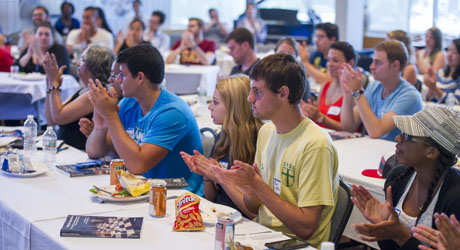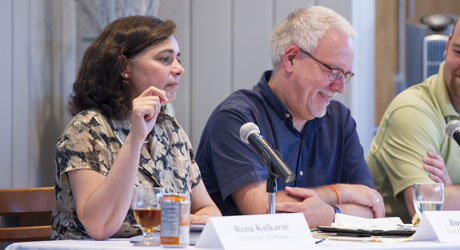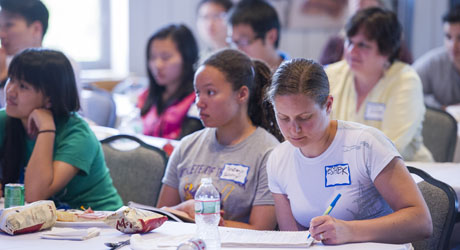An MBL SUCCESS Story: Providing Career Guidance to Young Scientists

On a sunny summer day in Woods Hole, about seventy young scientists are eschewing the waterfront benches just outside their MBL labs and are instead packed into a non-air-conditioned room, listening attentively while munching on sandwiches.
They’re not here for the free lunch they’re enjoying—most of them are already on an all-inclusive student meal plan. Instead, they’re here by choice for the SUCCESS program, an MBL initiative to provide career advice to students and early-career scientists on campus.
 SUCCESS participants applaud at the end of a panel discussion. Credit: Tom Kleindinst
SUCCESS participants applaud at the end of a panel discussion. Credit: Tom KleindinstThe program, now in its second year, offers a seven-week series of lunchtime workshops focused on career skills. Each week, a rotating session chair organizes a group of three or four panelists, many from outside the MBL. Session organizers strive to find panelists from different backgrounds, incorporating the perspectives of scientists working in academia, industry, and institutional settings. Some of the weekly topics this year include conducting a job search, making a standout résumé, and giving an effective presentation. The final workshop of the season, on connecting with effective mentors, will take place this Wednesday.
After panel members have shared their experience on the topic at hand, the participants break into small discussion groups. At the end, the groups reconvene for a question-and-answer session. The workshops are kept informal in order to encourage students to ask questions they might not feel comfortable posing in a more formal setting.
Scott Allen, a recent graduate of Bridgewater State University who first attended SUCCESS last summer, says the advice on resumes and CVs he received was “amazingly helpful” when he applied for his current job—as a research assistant at the MBL!
SUCCESS has been a collaborative venture from the beginning, the product of support from both within and outside the MBL. The idea initially arose from a 2009 conversation between Barbara Jones, a member of the MBL Board of Overseers, and MBL Adjunct Senior Scientist Steve Zottoli of Williams College. Jones and Zottoli noticed that many students came to the MBL without a strong sense of how to proceed in the world post-college, and proposed implementing a career workshop to help guide them. Jones took notes on their conversation, stashed them in a file cabinet, and forgot about them; during a cleaning spree two years later, she stumbled upon the notes—and decided to put them into action.
After receiving an enthusiastic go-ahead from Gary Borisy, then director of the MBL, Jones recruited other supporters at the MBL for her cause, chief among them Kristine Johnson, Director of Special Gifts and Planned Giving, Bill Reznikoff, Director of Education, and Zottoli. After many hours of discussion along with several other MBL scientists, they created SUCCESS: Shaping and Understanding Career Choices in Education, Science, and Self.
The speakers at the weekly SUCCESS sessions—leaders in their fields—have been eager to share their knowledge, contributing to the popularity of the program. “When these panels were formed last year, there was overwhelming enthusiasm to participate,” says Johnson. In fact, they had more interested panelists than they could fit into seven sessions.
 Rénu Kulkarni, associate vice president for strategic initiatives at the University of Chicago, responds to a question during a SUCCESS workshop on science careers outside of academia. To her left are fellow panelists Jim McIlvain of Zeiss, a senior applications specialist based at the MBL, and Dave Johnston, Ph.D. Credit: Tom Kleindinst
Rénu Kulkarni, associate vice president for strategic initiatives at the University of Chicago, responds to a question during a SUCCESS workshop on science careers outside of academia. To her left are fellow panelists Jim McIlvain of Zeiss, a senior applications specialist based at the MBL, and Dave Johnston, Ph.D. Credit: Tom KleindinstThis year they have recruited a scribe, MBL Research Associate Esther Pearl, who takes detailed notes on every workshop. Jones hopes that the notes will be edited into an online resource for young scientists who may not be able to attend the presentations but who are curious about the topics addressed.
While SUCCESS has been a team effort from the beginning, Zottoli credits Jones and Johnson with moving the program forward. “Ideas are cheap, but actually implementing them is much more difficult,” he says. “You have to find the people and meet with them… You have to organize it and then hope that the clientele come.”
The clientele have come. Last year, 140 students attended at least one session over the course of the summer; attendance is similar this year. The attendees range from recent high-school graduates to postdoctoral fellows, plus several established MBL researchers who drop in frequently to contribute to the conversation. Young scientists from other local institutions, including Woods Hole Oceanographic Institution and NOAA Fisheries, are also taking advantage of the workshops, not only for their educational value but to meet their Woods Hole colleagues.
Allen believes that the program has staying power, even among repeat students. “I’m back for a second year and it’s continued to be great. They’ve kept the topics the same, but they’ve mixed it up a little. The panelists change, so you definitely learn new things even two years in a row,” he says.
Many schools offer career training for their students, but SUCCESS strives to provide something different. “I think the SUCCESS program at the MBL is unique,” says Zottoli. “At most colleges, faculty members and maybe a few others would run the program, but here it’s a mixture of individuals from all over the world.”
 SUCCESS scribe Esther Pearl, a research associate at the MBL, takes notes on the workshop. Credit: Tom Kleindinst
SUCCESS scribe Esther Pearl, a research associate at the MBL, takes notes on the workshop. Credit: Tom KleindinstAshley Ngo, a rising junior at Williams College and a summer undergraduate researcher at the MBL, agrees. She says that the program has given her advice on “things [she’d] never have thought about, like funding and careers outside of academia.” She cites a workshop on careers in industry in which students were asked to consider what they could obtain with a Ph.D. versus the six years of work experience that would be gained if they didn’t pursue an advanced degree. “That helped me think about whether I want to pursue graduate work,” says Ngo.
The organizers have poured a great deal of time and money into the venture, but they are quick to emphasize the real reason for their efforts. “I want people to have the opportunity to have access to things they want to try out, hopefully while young,” says Jones.
“It’s not about us,” adds Johnson. “It’s about the collaborative venture with the panelists to expand the skill sets of the students and give them contacts.”
***